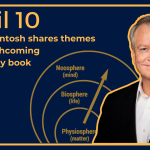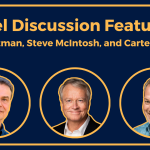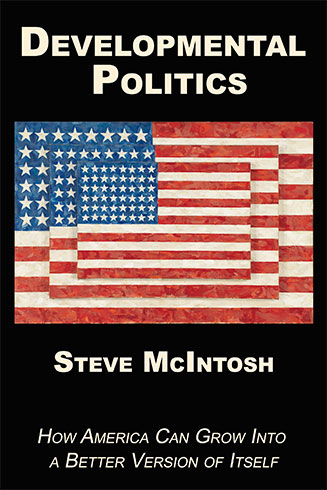Evolution’s Purpose
Preface
Ever since I was a teenager in the 1970s I have had a passionate interest in the aspects of science that point to, or otherwise hint at, the existence of a larger reality. Back then, my scientific interests included quantum physics, self-organizing systems, and the study of consciousness. Although my professional development eventually took a different path, I continued to study and contemplate the intersection of science and spirituality. Then in the late 1990s I became acquainted with an emerging new form of philosophy known as integral philosophy, which has since become the central focus of my working life.
Integral philosophy is essentially a philosophy of evolution that emphasizes the evolution of consciousness as a central factor in the process of evolution overall. This new perspective is compelling and important because it demonstrates the connection between the personal development of each person’s values and character and the larger development of human history. Through its insights into the evolution of human consciousness and culture, integral philosophy offers realistic and pragmatic solutions to the growing global problems that are increasingly threatening our civilization. That is, from the perspective of this philosophy, every problem in the world can be understood, at least partially, as a problem of consciousness. So it follows that the solutions to seemingly intractable problems, such as environmental degradation and climate change, nuclear proliferation and terrorism, hunger and overpopulation, unregulated globalization and gross inequality, can all be effectively ameliorated by raising or changing the consciousness that is continuing to create (or prevent) these problems. Moreover, when we understand human history from this perspective, we can see how, in at least some places, human nature itself has developed, values and worldviews have evolved, and concepts of “worldcentric” morality have come to replace more narrow ethnocentric sensibilities. As a result of the co-evolution of consciousness and culture, some segments of the world’s population have increasingly come to reject war, to condemn oppression, and to place a high value on the preservation of our natural environment.
As my understanding of this new philosophy of evolution grew, I was eventually moved to try to make a contribution to the field, which led to my last book, Integral Consciousness and the Future of Evolution. The book described the basic contours of integral philosophy and offered some constructive critiques of its leading authors. It also applied integral philosophy’s understanding of evolution to politics, psychology, and spirituality in an attempt to expand the scope of this emerging perspective. Integral Consciousnesswas well received by reviewers and readers, and as a result of its success, I have established many new relationships and have come to an even deeper understanding of integral philosophy’s central subject: the ever-present process through which everything in the universe has come to be—the unfolding epic of evolution. Although I was initially drawn to integral philosophy because it promised to solve real world problems, as my understanding deepened, I realized that this philosophy’s greatest potential to improve the human condition can be found in its ability to help us better comprehend evolution itself.
Through integral philosophy, I have come to see that the evolutionary story of our universe, when understood in its entirety from the flaring forth of the big bang, through the emergence of our solar system, through the evolution of life, and up through the development of human society and culture, carries an unmistakably spiritual message. This message is discovered as we begin to appreciate the unfathomable value that evolution has produced in the course of its development, and how evolution’s generation of value discloses its progressive character. And as we come to clearly see how evolution progresses, this reveals evolution’s purpose. As we will explore throughout this book, the evident purpose of evolution is to grow toward ever-widening realizations of beauty, truth, and goodness; and it is through the generation of these most intrinsic forms of value that evolution expresses its spiritual message.
One of the most compelling features of this conception of evolution’s purpose is that it is apparent in the scientific facts themselves. Recognizing evolution’s purpose does not require us to adopt a specific belief system or otherwise buy into an authoritative spiritual teaching; the meaning and value of evolution can be readily seen once we carefully consider what science and philosophy have now disclosed. However, although most of the evolutionary science that provides the foundation of our discussion has been around for decades, it is only in the last few years that we have begun to grasp evolution in its fullness. And this breakthrough in our understanding of evolution overall has resulted from the enlarged appreciation of the cultural or psychosocial aspects of evolution brought about by the recent insights of integral philosophy. This new philosophy of evolution helps us directly experience the truth of evolution’s underlying purpose because it shows how the personal sense of purpose that we feel in our individual lives is directly connected to the larger movement of evolution as a whole. Stated differently, the evolutionary impulse to make things better that we feel in our hearts and minds is the very same impulse that has been driving the unfolding emergence of the universe from the beginning.
Once this became clear to me, I felt the excitement of what seemed like a new discovery. I could sense that if evolution’s purpose—both personal and universal—could be convincingly demonstrated, this insight could help bring about further evolution in consciousness and culture. Because once it has been properly pointed out, the purpose of evolution becomes relatively self-evident and self-authenticating. And as more people come to see and agree about this momentous truth, this can help us achieve greater social solidarity and stronger political will, it can make us more effective at addressing humanity’s problems, and it can increase our sense of collective well-being by helping us to feel more at home in the universe.
When we begin to appreciate evolution’s larger meaning, this does not replace or invalidate the teachings of existing spiritual traditions, rather, it confirms much of what these traditions have been teaching all along, while also refining and improving their essential message. The philosophical recognition of evolution’s purpose uplifts both religion and science by better integrating and harmonizing these two indispensible approaches to truth.
Although the meaning and value of evolution does become increasingly evident through philosophical reflection, understanding evolution’s purpose in its fullness is not simple or easy. But even though some of the arguments in this book may require sustained concentration to be fully grasped or otherwise appreciated, my ultimate thesis is straightforward: evolution is making things better. Despite the inevitable growth of problems and pathologies, and despite the ongoing presence of suffering and evil in this world, I hope to show how the process of evolution generally moves in directions of intrinsic value. Although our understanding of intrinsic value itself has evolved by dialectical steps and stages throughout history, we can nevertheless detect an enduring current in the cosmos that has been growing from the beginning toward the beautiful, the true, and the good. While this thesis may at first sound lofty or idealistic, the supporting arguments do not rely on any supernatural explanations or spiritual authorities. The evidence for every one of my conclusions can be found either in the discoveries of science or in experiential realities familiar to all of us. So in the discussion that follows, we will only transcend science where in doing so we are able to adequately include all relevant scientific facts within our analysis. And by the end of our discussion I trust you will agree that descriptions of evolution which portray it as a purely accidental and essentially meaningless process have now become as outmoded as claims that the world was literally created in six days.
/snip/
[/box]


